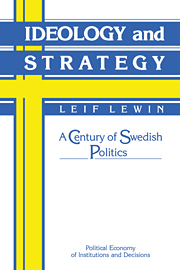Book contents
- Frontmatter
- Contents
- List of tables
- Series editors' preface
- Author's preface
- 1 The problem of rationality
- 2 Tariffs
- 3 Suffrage
- 4 Parliamentarism
- 5 The crisis agreement
- 6 Economic planning
- 7 The supplementary pension system
- 8 Nuclear power
- 9 Employee investment funds
- 10 Strategic action in politics
- Appendix
- Index
Series editors' preface
Published online by Cambridge University Press: 29 September 2009
- Frontmatter
- Contents
- List of tables
- Series editors' preface
- Author's preface
- 1 The problem of rationality
- 2 Tariffs
- 3 Suffrage
- 4 Parliamentarism
- 5 The crisis agreement
- 6 Economic planning
- 7 The supplementary pension system
- 8 Nuclear power
- 9 Employee investment funds
- 10 Strategic action in politics
- Appendix
- Index
Summary
The Cambridge series in the Political Economy of Institutions and Decisions is built around attempts to answer two central questions: How do institutions evolve in response to individual incentives, strategies, and choices; and how do institutions affect the performance of political and economic systems? The scope of the series is comparative and historical rather than international or specifically American, and the focus is positive rather than normative.
Leif Lewin uses rational political models to analyze significant political events. His models explain the interactions of rational agents pursuing their goals in a political context constrained by the goal-seeking activities of other rational actors. His events are taken from the last century of Swedish political (especially parliamentary) history, but readers will easily find parallel episodes elsewhere. Lewin employs both formal reasoning and careful analysis of historical materials to analyze cases that range across the conflict between free traders and protectionists in the late nineteenth century, the introduction of universal male suffrage and electoral reform in the early twentieth century, cooperation between social democratic and bourgeois parties on the planned economy in the late 1940s, and the decision to utilize and develop nuclear power plants in the late 1970s.
Lewin's game-theoretic analysis focuses on the choices of political actors. Many of these readily found winning strategies.
- Type
- Chapter
- Information
- Ideology and StrategyA Century of Swedish Politics, pp. ix - xPublisher: Cambridge University PressPrint publication year: 1989

